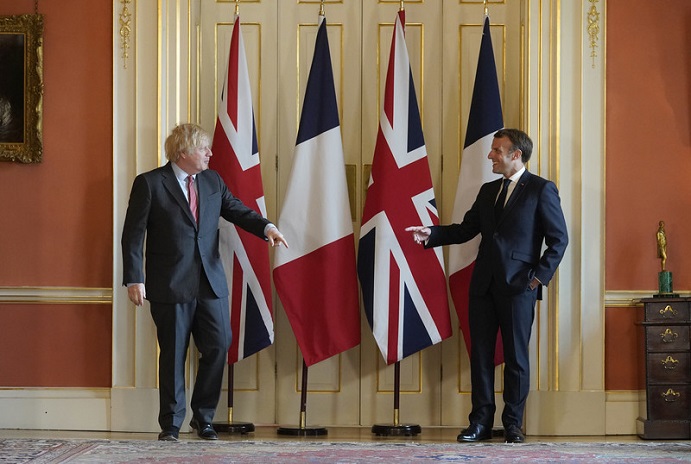
David Cronin
The Electronic Intifada / December 10, 2020
Pomp is usually absurd. Pomp amid a pandemic is obscene.
Emmanuel Macron deserves nothing but scorn for the manner in which he welcomed Abdulfattah al-Sisi to Paris this week. The Egyptian dictator was bestowed with the highest honour of the French state.
Macron apparently did raise the case of Ramy Shaath in his conversations with al-Sisi. A Palestinian activist married to a French citizen, Shaath was arrested in Cairo during July 2019 and has been detained arbitrarily ever since.
It was nonetheless clear that the suffering of political prisoners was not foremost on Macron’s mind.
He accorded far greater priority to the deepening of “defense” cooperation with Cairo. That, after all, is big business: France overtook the US as Egypt’s top weapons supplier in the few years following the bloody coup that brought al-Sisi to power in 2013.
In 2017 – the year Macron was elected president – France delivered $1.7 billion worth of arms to Egypt. Macron indicated this week that he wants those deliveries not only to continue but to increase.
While it rolls out red carpets for al-Sisi, France is going through something of a breakup with Britain at the moment.
Britain has formally left the European Union and the final terms of the divorce are now under negotiation. France, already a powerful player in the EU, is likely to be even more dominant.
Eerily similar
Despite their divergences, France and Britain are following eerily similar scripts when it comes to the Middle East.
Boris Johnson, the British prime minister, has generally struck the same poses toward al-Sisi as Macron. Johnson is committed to maintaining a “strong partnership” with Egypt on “security” matters, his press team announced during the autumn.
Speaking of “strong partnerships,” Egypt has teamed up with Israel to enforce a medieval siege on Palestinians in Gaza for more than a decade.
Britain and France both voice “concern” about the plight of the Palestinians every so often. Their “concern” is negated by their actions.
Along with deepening cooperation with Egypt, they are both hopping into bed with Israel’s forces of occupation.
The British and Israeli militaries have just signed an agreement on strengthening their relationship.
The full terms of the pact are secret. But Conservative Friends of Israel – a pressure group within Britain’s ruling party – seems privy to important details and suggests that the agreement is very comprehensive.
The group’s website says the deal “is thought to cover areas of warfare such as maritime, land, air, space and cyber and electromagnetic.”
French and Israeli commanders have also been holding discussions lately about how to work more closely together.
Making oppression normal
Back in 1916, Britain and France decided to divide the Middle East between them.
The Sykes-Picot accord – as that carve-up is known – was followed the next year by pledges of support from Paris and London to support Zionist colonization in Palestine. France was first to do so, although Britain’s pledge – the Balfour Declaration – had greater consequences.
The Balfour Declaration was enshrined in the League of Nations mandate under which Britain assumed responsibility for administering Palestine in the early 1920s. France was put in charge of Syria and Lebanon during the same period.
The British and French elites are behaving as if the arrangements – or at least the mindsets – of the 1920s still apply in the 2020s. How else should we interpret the way Macron paraded through Beirut, pretending to be its savior, after the port explosions in August?
And how else should we interpret Britain’s eagerness to see Israel – a state which it was instrumental in establishing – “normalize” its relations with Gulf monarchies?
With more than a little help from Britain and France – and, of course, fully facilitated by the US – Israel is convincing various governments to accept its oppression of the Palestinians as normal.
And the army meting out that oppression is being treated as a model.
David Cronin is an associate editor of The Electronic Intifada; his books include Balfour’s Shadow: A Century of British Support for Zionism and Israel and Europe’s Alliance with Israel: Aiding the Occupation












